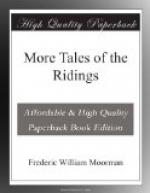She needed all the cheering that the sights and sounds of nature could give her. As she climbed the hill-side and saw the seventeenth-century farm-house, with its mullioned windows and hood-mouldings, her heart sank within her. The cruel memory of the morning when she had last left it came back to her mind, and the hard look of Learoyd, as he disclosed his purpose to her, made her flinch. She closed her eyes for a moment, as though to shut out the past, and then braced herself for the coming interview. Arrived at the front door, which opened directly into the kitchen, she paused for a moment to summon up her courage, then knocked, and, without waiting, lifted the latch. Learoyd, still too weak to attend to farm duties, was seated in the arm-chair by the fire; in his hands was the family Bible, but he was not reading. Mary was shocked at the change which fifteen years had wrought in him. He was not more than sixty, but he looked at least ten years older, and in his eyes there was the look of a hunted animal. The sullen pride, which was the habitual expression of his face in the old days, had given way to a look of morbid irritability. The farmer looked up from his book as she entered, but, failing to recognise her, asked who she was.
“It’s Mary,” she answered, and advanced towards him.
“Mary!” he exclaimed, and then, realising who Mary was, he shrank from her as though she had been an avenging spirit. The Mary of his dreams, the girl standing in the market-place with a halter round her neck, came back to his mind and deepened the look of terror in his eyes.
“What doesta want wi’ me?” he exclaimed, in a harsh whisper.
“I’ve coom to tak care o’ thee,” Mary replied.
“Thou’s coom to plague me, that’s what thou’s coom for. I know thee. I’ve seen thee o’ neights, aye, an’ i’ t’ daytime too; an’ if it’s revenge thou wants, I tell thee thou’s gotten it already, capital an’ interest, interest an’ capital.”
Mary’s swift intuition afforded her an insight into Learoyd’s mind. She realised that the fangs of remorse were buried in his heart and she determined to remove them at all costs.
“Father,” she said—and it was hard for her to utter the word which even when she was a child had seemed unnatural to her—“let us forget all that’s gone afore. Sufferin’ has coom to both on us, but it has bin warr for thee nor ever it was for me. Let us start agean.”
As she said this she knelt down by the side of his chair and gently stroked his hands and smoothed back the iron-grey locks that had fallen over his eyes. At first he shrank from her touch, but in a little time it soothed his agitation. After all, this was not the Mary Whittaker that he had seen in his dreams, and the soft grey eyes that looked steadily into his face were different from those downcast eyes in the figure of the haltered girl that haunted him.




